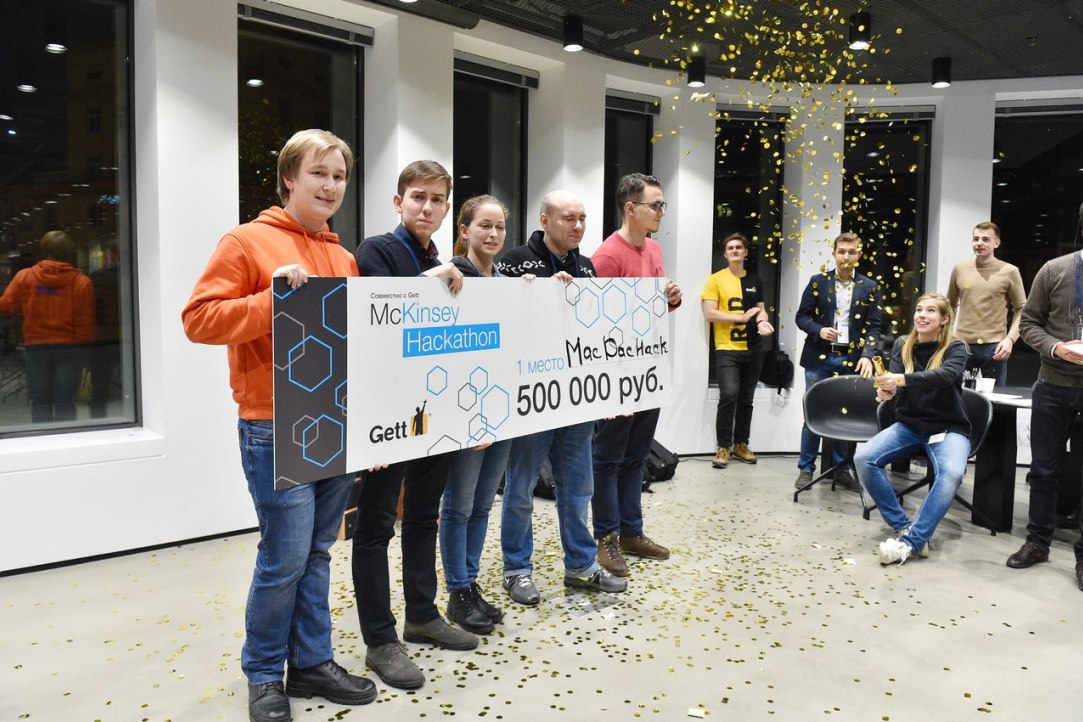HSE Students Win Hackathon Held by McKinsey and Gett

The MacDacHack team, which includes HSE students and one alumna, recently won a Big Data hackathon held by McKinsey and Gett.
A total of 24 teams only had 24 hours to develop projects, which would improve Gett’s taxi service operations. The projects were based on data directly provided by the company. The MacDacHack team included Alexander Orlov and Pavel Adamenko, first-year Master’s students in Financial Technologies and Data Analysis, Dinara Faizullina, alumna of the HSE Faculty of Computer Science, Vladislav Konyukhov, first-year Master’s student in Governance of Science, Technology and Innovation, and Timur Khismatullin, first-year student from MIPT. For their project, the team decided against exceeding Gett’s algorithms with respect to the speed of its taxi delivery service, nor did they attempt to change the company’s traffic information or ranking system. Instead, they came up with a concept, whereby possible locations could be suggested to users. This, in turn, would make ordering taxi easier and faster, as well as give precise instructions on how to get to the right locations. To do that, they gave special consideration to the online services used for developing taxi routes.
‘Imagine you’re heading out to unfamiliar area. You arrive at the metro station, and then you must decide on the exit you must use to find a taxi,’ said Alexander Orlov, adding: ‘Sometimes, it’s easier to find one at the opposite side of the street. Making the wrong choice on where to start on big road can add several kilometers to one’s trip. With this in mind, our idea was to suggest popular points, which are frequented by the app’s users. We also added information about metro stations, train stations, shopping centres and office buildings.’
The ideas submitted by the teams were evaluated according to four criteria: technical excellence of the algorithm; performance of the solution; originality; and quality of the project’s presentation.
According to a representative of McKinsey, the solution suggested by the MacDacHack team will likely be used in Gett’s actual operations.
See also:
Engine for Game Development Created at HSE University
The ‘Game Engineering and Interactive Systems’ workshop team of the HSE Tikhonov Moscow Institute of Electronics and Mathematics (MIEM) invites everyone to participate in testing the Claw Engine, the first version of their game development program. This new tool allows for processing three-dimensional images and programming one’s own scripts.
FCS Team Takes First Place at Rosneft Universities’ Hackathon
A team from HSE University’s Faculty of Computer Science took first place in a Rosneft hackathon held in October among the country’s universities. The hackathon was organised by the research institute RN-BashNIPIneft LLC. The competition participants had the chance to try their hand at solving real production problems.
‘It Doesn’t Test, It Teaches’: Hackathon for DANO Data Analysis Olympiad Held in Nizhny Novgorod
A hackathon was held in Nizhny Novgorod for students in grades 9–11 as part of the Data Analysis National Olympiad (DANO). More than 90 school students in grades 9–11 from Moscow, Nizhny Novgorod and the surrounding region, St Petersburg, Samara, Cheboksary, and Ufa—a total of 15 Russian regions—took part in the hackathon.
Students from Leading Universities Take Part in Hackathon Organised by MTS and HSE University
At the end of June, HSE University hosted Reklamathon, an inter-university hackathon in which participants must develop a prototype product for forecasting the effectiveness of advertising campaigns on social media. The event was organised by HSE University’s Data-Driven Communication master’s programme, which trains communications industry specialists. The hackathon’s assignments and judges were arranged by MTS, Russia’s largest digital ecosystem.
‘I Like to Think that the Solutions We Find Can Help People in the Future’
Innopolis University has announced the results of Global Al Challenge, an international AI industry online hackathon in which teams of developers compete to create new materials using artificial intelligence. The DrugANNs team, which included students from the HSE University Faculty of Computer Science, took third place.
HSE MIEM Holds 2020 GameDevTech Hackathon
This month, the HSE MIEM GameDevTech 2020 game development hackathon held its closing ceremony where the winning student teams were announced. The HSE News Service looks at how the hackathon was organized and who won.
HSE Students Take Third Place at Junction International Hackathon
This year 1500 participants from 100 countries took part in the Junction International Hackathon. A team of second-year students of the HSE Faculty of Computer Science (Timofey Smirnov, Igor Zverev, Ainur Nuriev and Aldar Danilov) led by Maxim Dyakov (first-year student of the programme in E-Business) presented a smart lighting project.
Eight Teams Compete in HSE’s First Data Science Hackathon
HSE University has recently hosted an SAS Data Hack Platypus data analysis hackathon, where teams competed to solve a case problem provided by the online hypermarket, Utkonos (or, in English, ‘Platypus’).The top five finalists received devices from partner companies as gifts.
MIEM HSE Students Develop MRI Smart Blanket
The smart blanket was presented at Sirius Scientific and Technological University in Sochi and awarded first place at a physical sciences hackathon. Over the course of one day, 15 student teams had to choose a topic, study the market, develop a concept, and present a prototype of their electronic device.
‘Simply Knowing How to Code Isn’t Enough’
Over the last several years, hackathons have gone from being competitions for geeks to a must-have line on the resume of almost any job seeker. HSE University students are participating in these kinds of competitions more and more often, and they sometimes even organize their own. Alexander Popovkin, head of HSE’s Hacking Club, spoke with HSE News Service about the benefits and drawbacks of hackathons.


